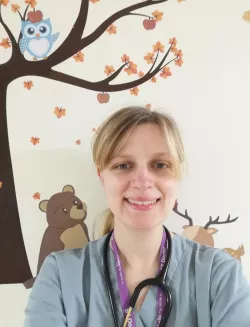
During the coronavirus pandemic and lockdown, we have seen fewer viral and bacterial infections in children, and the wards have been generally quieter than usual. Recently, thankfully children have gone back to school, which inadvertently lead to an increase of infectious illnesses in children. Naturally, we have therefore been inundated with referrals. As it often happens in a district general hospital, our neonatal unit was remarkably busy too, due to having premature sick babies.
Therefore, as many paediatric registrars in the country, I really had to step up my organisational skills recently. I had to divide my time between the two children's wards and neonatal intensive care. Luckily, we have not had any resus calls to Emergency Department.
This has not been easy, but there are some practical strategies which helped me and the team cope with the workload.
- Handover is vital - as that is when you get an idea of what is happening in each area you are covering. In our district general hospital, the referrals go though to level one trainees, so at handover I would get an update about all the patients we are expecting.
- Communication is key, especially with the nursing colleagues. Close communication with the sister in charge is essential, mainly about the sick patients, but also about the bed status.
- Maintaining the team spirit is of utmost importance in the toughest of times. Knowing your team, expressing your appreciation for all the hard work and smiling behind your mask can go a long way.
- Learn to delegate, but make sure to split jobs between colleagues according to their level of experience and competence.
- Quick check-ins with colleagues are crucial, both to know any concerns about sick patients and to keep an eye on the overall workload. When not possible to do this in person, phoning or bleeping your colleagues for a quick chat works well too.
- Be there for colleagues and let them know that they can contact you any time about any queries or worries they might have. Make sure they know your bleep, and phone number and know where you are.
- Prioritise your workload - reviewing as many new patients as you can might seem tempting, but remember your main priority are the sickest patients.
- Seek advice when appropriate - know who the consultant on call is. When concerned, it is better to call for advice sooner rather than later.
- Look after yourself in the busyness of it all, make sure you breathe, eat and rest a little. Try to ensure your colleagues do the same.
- It’s ok not to be ok - stress can take over despite everything. It is a part of life and better to acknowledge it when things are not going ok than to let it simmer and rise. We are after all only human.
As stressful as the recent times have been, it has all been a great experience. It helped to shape us as a team and helped to shape myself as a doctor. The main learning point from this is that I cannot always physically do all the things I need to do.
Paediatrics is a wonderful speciality to work and train in, and there is as much art to it as there is science. When things get stressful, focusing on the beauty of the teamwork and job satisfaction helps to cope with it all.









